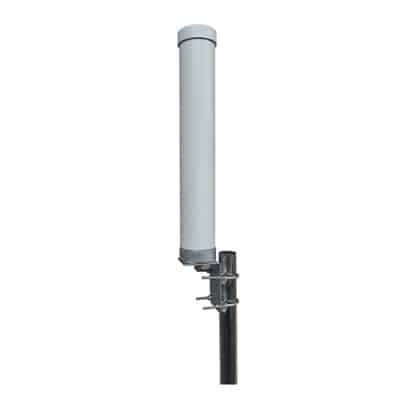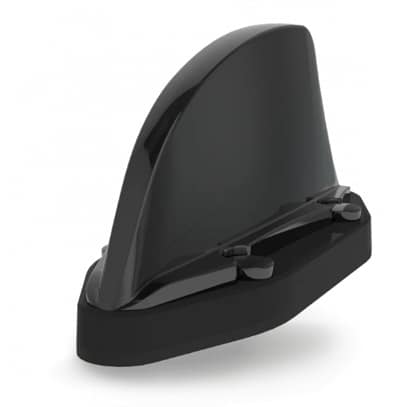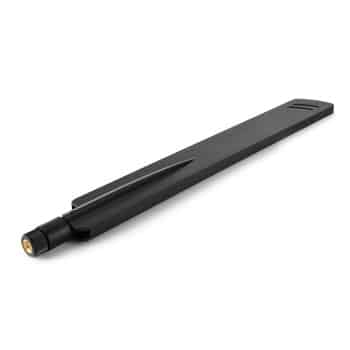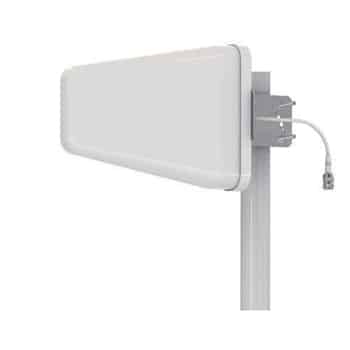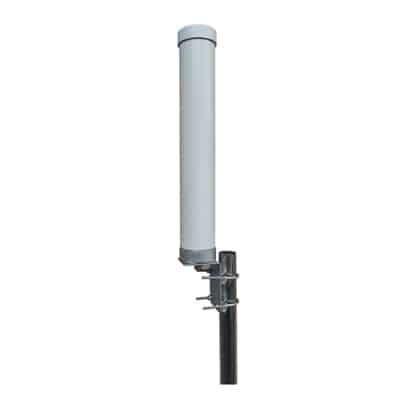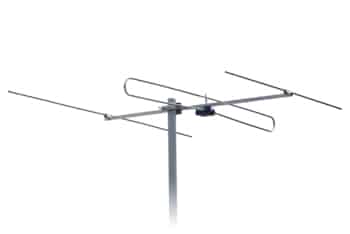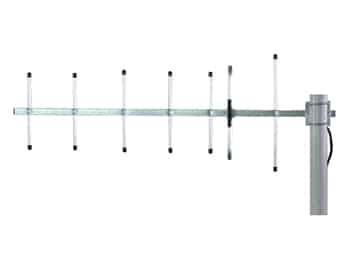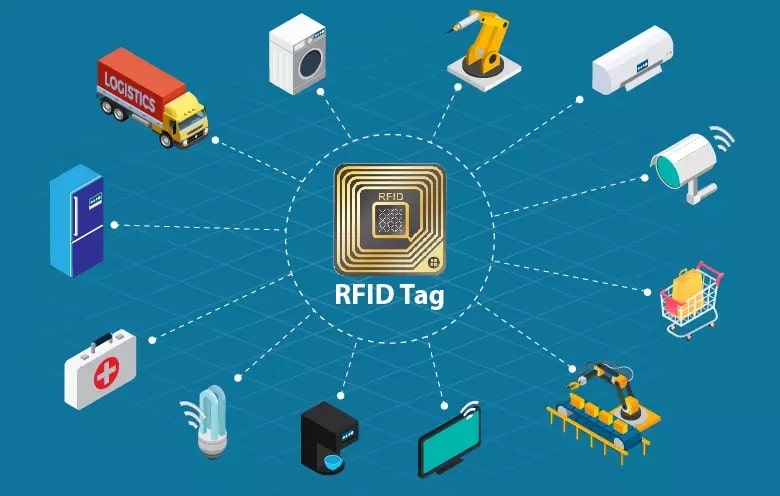
The Internet of Things (IoT) has become popular recently due to the advancement of the Internet and different communication protocols. IoT deals with different devices connected as a network to achieve a common goal. RFID(Radio Frequency Identification) is a communication technology where electromagnetic radio signals are used to identify and detect the presence of objects within a short range of distance. RFID and IoT are complementary technologies used to interconnect many devices and sensors. These technologies have enabled a wide range of applications, that we discuss in this article. Since RFID is limited to a short operation range, IoT approaches can be used to enhance the coverage distance and reliability of RFID-related operations. For example, an RFID reader can acquire readings, and send them to cloud servers via the Internet with the help of IoT technologies.
Table of Contents
ToggleThe Role of RFID in IoT
RFID system consists of three main components, namely, the RFID reader, tag, and RFID antenna. An RFID reader can read information stored in an RFID tag and send it to a processing application or service. Therefore, we can see that an RFID system serves as a sensing element in an IoT network. With smart applications and the internet, an RFID system can be seen as a fully stacked IoT solution, leading to many applications related to IoT. These applications are discussed in this article in the later sections, however, let us first investigate the benefits of integrating RFID with IoT.
Benefits of Integrating RFID with IoT
With the integration of RFID in IoT, the applications’ effectiveness and security can be enhanced. Some of the benefits of integrating RFID in IoT are as follows:
- Enhanced Data collection capability: RFID systems can collect a multitude of data and can save much data compared to barcodes. This information includes temperature, expiration date, location, etc.
- Security: RFID systems provide additional security such as authentication and data integrity.
- Real-time tracking: RFID systems can track in real-time, hence ideal for applications such as supply chain management and asset tracking.
- Automation ability: RFID systems can achieve levels of automation to automate tasks that require authentication and access permission.
- Scalability: RFID systems can be easily scalable serving varied sizes of business processes.
- Cost-effectiveness: RFID systems are cost-effective solutions when compared to more advanced IoT sensing elements in the market.
Applications in the Supply Chain Management
RFID systems provide facilities for warehouse managers and logistics managers to track their assets and services in real time. Inventory management is a widely used application of RFID in supply chain management. One of the key benefits of using RFID in supply chain management is it improves warehouse operations such as storing, dispatching, and distribution of stocks. Also, it enhances the transparency of supply chain operations by providing vital information such as location, ownership, and status in real time. Thus, reducing any bottlenecks in the supply chain management process and optimizing the business.
Another application of RFID in supply chain management is to prevent security breaches and ensure the security of the transactions. It also helps to minimize the costs of inventory management and increase the efficiency of inventory management.
What can Tesswave do for you?
Tesswave provide 100+ antenna products and you can contact us for antenna customized solutions, get in touch with us today to get a Free quote.
Get an Instant Quote
Get a FREE quote and we will contact you within an hour
Applications in Healthcare
The healthcare industry requires continuous monitoring of patients and their vitals, and these modes should be highly secured. These attributes of the industry make RFID systems a viable candidate for such applications. One such application of RFID is to track medical equipment. RFID tags containing essential information about the equipment can be acquired to ensure proper maintenance of the equipment and proper usage.
Patient monitoring can be made easy and optimized with the help of RFID tags. These are most suitable for containing vital patient information and making it easy to access it easily. RFID tags can be used to store vital patient history and readings such as heart rate and temperature. This makes it easy for the medical staff to access the correct information without relying on the patient. Thus, improving patient care. All these RFID applications can be enhanced as IoT applications, where the relevant authorities can monitor the relevant information remotely.
Applications in Smart Cities
Smart cities are becoming popular with the advancement of IoT and its widespread in different industries. With the integration of RFID, smart city applications such as the enhancement of smart transportation is possible. For example, RFID tags can be used in public transportation to track buses and trains making it easy for the public to commute. Further, the information acquired by RFID tags can be used to control the traffic in real-time and optimize the flow of traffic.
Furthermore, RFID systems alongside IoT can be used in waste management. RFID tags can be mounted on garbage collecting trucks to track them and optimize their flow. This information can be important in introducing a charging scheme or a more optimized garbage collection route.
Applications in Agriculture
Agriculture is one of the most growing industries with the advancement of IoT. IoT in agriculture with RFID technology can lead to many applications. One such application is livestock management. Here RFID tags can be placed on livestock to track them in real-time. This will increase productivity and reduce costs.
Another application of RFID and IoT in agriculture is to monitor the status of crops. Here RFID tags alongside necessary IoT sensors can be used to monitor the health of the crops thus increasing crop quality, controlling pests and diseases, and improving the crop yield. Moreover, RFID and IoT can be used in smart irrigation to monitor different environmental factors and monitor their condition continuously.
Applications in Retail
Retail business plays a key role in ensuring the fulfillment of many consumer needs. IoT alongside RFID can address some of the issues faced in the retail business. One such issue is inventory management. RFID tags alongside IoT applications and sensors can be interfaced to monitor and collect and store valuable information about the inventories of a business. Moreover, RFID with IoT platforms can be used for theft prevention and to maintain the authenticity and integrity of the inventory and stocks of the business. Furthermore, RFID tags can be used to improve the customer experience, by introducing different wireless and secure payment methods, and storing customer preferences for a more enhanced experience.
Challenges and Future Trends
Despite their wide usage, IoT and RFID integration can lead to different challenges. Security is one of the largest challenges faced by RFID-integrated IoT solutions. RFID tags can be exploited or physically harmed easily. Moreover, when it comes to RFID-based IoT integration on a large scale, it can lead to high costs, which may not be economically feasible for small and medium businesses. Also, RFID-integrated IoT solutions can sometimes, be incompatible when it comes to different large-scale applications.
However, RFID-integrated IoT applications have a promising future, with low-cost RFID systems which consume a small amount of energy and with enhanced security. Moreover, when it comes to data management with different cloud services and security features, RFID-integrated IoT applications are becoming popular. Furthermore, to address the incompatibilities in RFID and IoT integration different standards have been formulated.
Conclusion
In this article, we discussed the potential and importance of RFID-based IoT-integrated applications in different industries and fields. Despite the challenges that are focused on cost, security, and compatibility issues, RFID is becoming a promising candidate in many IoT applications to deliver more efficient and reliable forms of communication.

